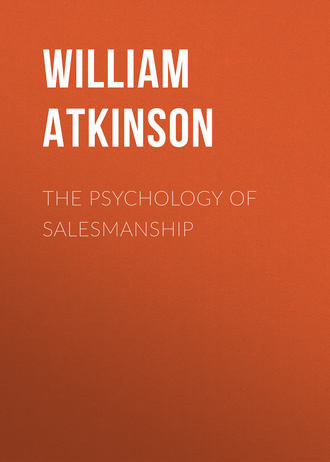 полная версия
полная версияThe Psychology of Salesmanship

William Walker Atkinson
The Psychology of Salesmanship
CHAPTER I
PSYCHOLOGY IN BUSINESS
Until the last few years the mere mention of the word "psychology" in connection with business was apt to be greeted with a shrug of the shoulders, a significant raising of the eyebrows – and a change of the subject. Psychology was a subject that savored of the class room, or else was thought to be somehow concerned with the soul, or possibly related to the abnormal phenomena generally classified as "psychic." The average business man was apt to impatiently resent the introduction into business of class room topics, or speculation regarding the soul, or of theories and tales regarding clairvoyance, telepathy, or general "spookiness" – for these were the things included in his concept of "psychology."
But a change has come to the man in business. He has heard much of late years regarding psychology in business affairs, and has read something on the subject. He understands now that psychology means "the science of the mind" and is not necessarily the same as metaphysics or "psychism." He has had brought home to him the fact that psychology plays a most important part in business, and that it is quite worth his while to acquaint himself with its fundamental principles. In fact, if he has thought sufficiently on the subject, he will have seen that the entire process of selling goods, personally, or by means of advertising or display, is essentially a mental process depending upon the state of mind induced in the purchaser, and that these states of mind are induced solely by reason of certain established principles of psychology. Whether the salesman, or advertiser, realizes this or not, he is employing psychological principles in attracting the attention, arousing the interest, creating the desire, and moving the will of the purchaser of his goods.
The best authorities on salesmanship and advertising now recognize this fact and emphasize it in their writings. George French, in his "Art and Science of Advertising" says regarding psychology in advertising: "So we can dismiss the weird word, and simply acknowledge that we can sell things to a man more readily if we know the man. We can't personally know every man to whom we wish to sell goods. We must therefore consider if there are not certain ways of thinking and of acting which are common to all men, or to a large proportion of men. If we can discover the laws governing the action of men's minds we will know how to appeal to those men. We know how to appeal to Smith, because we know Smith. We know what will please Brown, because we know Brown. We know how to get our way with Jones, because we know Jones. What the advertiser must know is how to get at Smith, Brown, and Jones without knowing any of them. While every man has his personal peculiarities, and while every mind has its peculiar method of dealing with the facts of life, every man and every mind is controlled, in a large sense and to a great extent, by predilections and mind-workings which were established before he lived, and are operated in a manner separate from his personality. Our minds are more automatic, more mechanical, than we are willing to admit. That which we loosely call mind is largely the automatic expression of tendencies controlled by physical conditions wholly apart from conscious intellectual or moral motives or qualities. What those physical conditions are, and how the knowledge of what they are may be utilized by advertisers, forms the body of that new knowledge some like to call psychology, so far as it concerns advertising." Mr. French has well expressed the idea of the important part played in business by psychology. What he says is, of course, as applicable to personal salesmanship as to salesmanship through advertisements – the same principles are present and operative in both cases.
In order to bring to the mind of the reader the full idea of the operation of psychological principles in the sale of goods, we shall mention a few particular instances in which these principles have played a part. Each reader will be able to recollect many similar instances, once his attention is called to the matter.
Prof. Halleck, a well known authority on psychology says: "Business men say that the ability to gain the attention is often the secret of success in life. Enormous salaries are paid to persons who can write advertisements certain to catch the eye. A publisher said that he had sold only five thousand copies of an excellent work, merely because it had failed to catch the attention of many, and that twenty-five thousand copies could have been disposed of in the same time, if agents had forced them upon the notice of people. Druggists say that any kind of patent medicine can be sold, if it is so advertised as to strike the attention in a forcible manner. Business life has largely resolved itself into a battle to secure the attention of people."
The same excellent authority says, regarding the effect of associated ideas: "An eminent philosopher has said that man is completely at the mercy of the association of his ideas. Every new object is seen in the light of its associated ideas. * * * The principle of the association of ideas is sufficient to account for the change in fashions. A woman in a southern city had a bonnet that she particularly admired, until she one day saw three negresses wearing precisely the same pattern. She never appeared again in that bonnet. When a style of dress becomes 'common,' and is worn by the lower classes, it is discarded by the fashionable people. Fashions that are absolutely repulsive will often be adopted if they are introduced by popular or noted people. * * * A knowledge of the power of the association of ideas is of the utmost importance in business. One man has his store so planned that all its associations are pleasing, from the manner of the clerks to the fixtures and drapery. Another store brings up unpleasant associations. * * * When negligee hats first made their appearance, a shrewd hatter sent for a well-dressed and popular collegian and offered him his choice of the best hats in the store, if he would wear a negligee hat for three days. He objected to making such an exhibition of himself, until he was flattered by the hatter's wager that the hats could, in this way, be made the fashion for the entire town. When the collegian first put in his appearance on the campus with the hat, he was guyed for his oddity. Late in the afternoon, some of his friends concluded that the hat looked so well that they would invest. On the following day large numbers reached the same conclusion. For some time after this the hatter found difficulty in keeping a sufficient supply in stock. Had an unpopular or poorly dressed man appeared first on the campus with that hat, the result would have been the reverse. The hat would have been the same, but the association of ideas would have differed. Some of the ladies of fashion in a large European city selected on their own responsibility, without consulting the milliners, a cheap spring Manilla hat, which was very handsome. The milliners found themselves with a high-priced stock for which there was no demand. They held a council, bought a large number of the cheap hats, and put them on the heads of all the female street sweepers and scavengers in the town. When the ladies of fashion went out the next day, they were amazed to see the very dregs of the city arrayed in headgear like their own. It was not very long before the result was what might have been expected."
In a previous work of the present writer, the following illustrations of the effect of psychological suggestion in advertising were used:
The use of the "direct command" as the "ad. men" call it, is very common. People are positively told to do certain things in these advertisements. They are told to "take home a cake of Hinky-dink's Soap tonight; your wife needs it!" And they do it. Or they see a mammoth hand pointing down at them from a sign, and almost hear the corresponding mammoth voice as it says (in painted words): "Say you! Smoke Honey-Dope Cigars; they're the best ever!!!" And, if you manage to reject the command the first time, you will probably yield at the repeated suggestion of the same thing being hurled at you at every corner and high fence, and "Honey-Dope" will be your favorite brand until some other suggestion catches you. Suggestion by authority and repetition, remember; that's what does the business for you! They call this the "Direct Command" in the advertising schools. Then there are some other subtle forms of suggestion in advertising. You see staring from every bit of space, on billboard and in newspapers and magazines: "Uwanta Cracker," or something of that sort – and you usually wind up by acquiescing. And then you are constantly told that "Babies howl for Grandma Hankin's Infantile Soother," and then when you hear some baby howling you think of what you have been told they are howling for, and then you run and buy a bottle of "Grandma Hankin's." Then you are told that some cigar is "Generously Liberal" in size and quality; or that some kind of Cocoa is "Grateful and Refreshing"; or that some brand of soap is "99.999 % Pure"; etc., etc. Only last night I saw a new one – "Somebody's Whisky is Smooth," and every imbiber in the car was smacking his lips and thinking about the "smooth" feeling in his mouth and throat. It was smooth – the idea, not the stuff, I mean. And some other whiskey man shows a picture of a glass, a bottle, some ice and a syphon of seltzer, with simply these words: "Oldboy's Highball – That's all!" All of these things are suggestions, and some of them are very powerful ones, too, when constantly impressed upon the mind by repetition. * * * I have known dealers in Spring goods to force the season by filling their windows with their advance stock. I have seen hat dealers start up the straw hat season by putting on a straw themselves, their clerks ditto, and then a few friends. The sprinkling of "straws" gave a suggestion to the street, and the straw hat season was opened.
Dr. Herbert A. Parkyn, an authority on Suggestion, draws the following picture from life of a retail merchant who is suffering from the effect of adverse psychological influences resulting from his pessimistic mental attitude. The present writer can vouch for the accuracy of Dr. Parkyn's picture, for he knows the original of the sketch. Dr. Parkyn says of the storekeeper:
"He is the proprietor of a store in a neighboring city; but such a store – it almost gives me the blues to go into it! His windows are dressed year in and year out with the same old signs, and there is nothing to give the store the cheerful appearance so essential to an up-to-date business establishment. But the atmosphere of the place is only in keeping with the proprietor. When he started in business thirty years ago he employed eight clerks, but his business has fallen off till he does all the work himself and is scarcely able now to pay rent, although competitors around him are increasing their business steadily every year. In the course of a fifteen minute's conversation, the first time I met him, he told me all his troubles, which were many. According to his story, everyone had been trying to get the better of him ever since he started in business; his competitors resorted to unfair business methods; his landlord was endeavoring to drive him out by raising his rent; he could not get an honest clerk in his store; an old man had not an equal chance with a young man; he could not understand why people he had catered to so faithfully should be so ungrateful or so fickle as to give their patronage to every upstart who went into business in the same line as his; he supposed that he could work along, as he was doing, from morning till night without a holiday till he was driven to the poorhouse or died, and although he had been in the same stand for fifteen years there was not a single person he could call on if in need of a friend, etc. Although I have had occasion to visit him many times during business hours, I have never heard him address a cheerful or encouraging remark to a customer. On the other hand he waited on them, not only with an air of indifference, but apparently as if he were doing them a favor by allowing them to trade at his store, while others who dropped in to ask permission to use his telephone or to enquire about residents in the neighborhood were soon given to understand by his manner and answers that he considered them a nuisance and hoped they had not mistaken his store for an information bureau. I have purposely led him into other channels of conversation, with the same result; everything was going to the dogs – the city, the country, etc. No matter what was talked about, his remarks were saturated with pessimism. He was ready to blame everything and everyone for his condition, and when I ventured to suggest that much of his trouble was due to his attitude he was ready to show me to the door. * * * If he would but cast his bread upon the waters for a few weeks by bestowing a smile here and a smile there, or a cheerful encouraging word to this customer and that customer, he would certainly feel better for the giving, and they would return to him a thousand fold. If he would only assume that he is prosperous and proceed to give his store an air of prosperity, how much more attractive he could make his place look and how much more inviting it would be for customers! If he would assume that every person that entered his store was his guest, whether he made a purchase or not, people would feel like returning to his store when they wanted anything in his line. I could suggest a hundred ways in which this man could employ suggestion and auto-suggestion to increase his business, to draw friends to him, instead of driving them away, and to make the world and himself better and happier while he lives in it."
But, you may ask, what has all this to do with psychology in salesmanship – what has the matter of advertising, store display, personal manner, etc., to do with salesmanship? Just this much, that all these things are based on the same fundamental principles as is salesmanship, and that these fundamental principles are those of psychology. All that has been said refers to psychology – all is the effect of psychology pure and simple. All depends upon the mental attitude, the suggestions offered, the mental states induced, the motive to the will – all these outward things are merely the effects of inner mental states.
J.W. Kennedy, in "Judicious Advertising" says: "Advertising is just salesmanship on paper; a mere money-making means of selling goods rapidly. That 'mysterious something' is just printed persuasion and its other name is 'selling conviction.' Conviction can be imparted at will by those few writers who have closely studied the thought processes by which conviction is induced. The mission of every ad. is to convert readers into buyers." Geo. Dyers, in the same journal says: "Advertising takes into account the sub-conscious impressions, the varying phases of suggestion and association as received through the eye, the psychology of the direct command, – all worth earnest consideration, and seriously to be reckoned with, however we may balk at the terms." Seth Brown in "Salesmanship" says: "To make advertising which will sell goods requires development of the human part of the writer. He must realize the different forces which command Attention, Interest, Desire and Conviction. The buyer wants your goods because they will produce for him some definite effect or result. It is this result that the ad. man must keep in mind."
"But," you may also say, "after all this 'psychology' seems to be nothing else than what we have always known as 'human nature' – there is nothing new about this." Exactly so! Psychology is the inner science of human nature. Human nature depends entirely upon psychological processes – it is bound up with the activities of the mind. The study of human nature is the study of the minds of people. But whereas the study of human nature, as usually conducted, is a haphazard, hit-or-miss sort of undertaking, the study of the mind, according to the established principles of psychology, is of the nature of the study of science, and is pursued according to scientific methods.
Particularly in its phase of Salesmanship does the study of human nature along the lines of psychology become a science. From the first to the last Salesmanship is a psychological subject. Every step in the process of a sale is a mental process. The mental attitude and mental expression of the salesman; the mental attitude and mental impression of the customer; the process of arousing the attention, awakening curiosity or interest, creating desire, satisfying the reason, and moving the will – all these are purely mental processes, and the study of them becomes a branch of the study of psychology. The display of goods on the counters, shelves, or windows of a store, or in the hands of the salesman on the road, must be based upon psychological principles. The argument of the salesman must not only be logical but must be so arranged and worded as to arouse certain feelings or faculties within the mind of the prospective buyer – this is psychology. And finally, the closing of the sale, in which the object is to arouse the will of the buyer into final favorable action – this also is psychology. From the entrance of the salesman to the final closing of the sale, each and every step is a psychological process. A sale is the action and reaction of mind upon mind, according to well established psychological principles and rules. Salesmanship is essentially a psychological science as all must admit who will give to the subject a logical consideration. To those who object to the term "psychology" because of its newness and unfamiliar sound, we do not care to urge the term. Let such cling to their old term of "human nature," remembering however that "human nature" is essentially mental. A dead man, a man asleep or in a trance, or an idiot, manifests no "human nature" in the sense the word is generally used. A man must be alive, wide awake, and in possession of his senses, before he is able to manifest "human nature," and before his "human nature" may be appealed to according to the well known principles. "Human nature" cannot be divorced from psychology, try as we may.
We do not for a moment wish to imply that Salesmanship is entirely dependent upon a knowledge of psychology. There are other factors concerned. For instance, the salesman must possess a practical knowledge of his goods; of the seasons; of the trend of fashion in relation to his line; of the adaptability of certain goods for certain sections. But, waiving for the moment the point that even these are concerned with the mind of people at the last, and admitting that they may be considered as independent of psychology, all of these points will avail nothing if the salesman violates the psychological principles of the sale. Give such a man the best goods, of the best house, with a thorough knowledge of the requirements of the trade and the goods themselves, and send him forth to sell those goods. The result will be that his sales will fall below the mark of a man far less well equipped in other respects but who understands the psychology of salesmanship, either intuitively or else by conscious acquirement.
Inasmuch as the essence of Salesmanship is the employment of the proper psychological principles, does it not seem imperative that the salesman should know something of the Mind of Man – the instrument upon which he must play in plying his vocation? Should not the salesman possess the same kind of knowledge of his instrument as does the musician, the mechanic, the artisan, the artist? What would be thought of one who would expect to become an expert swordsman without a knowledge of the principles of fencing, or of one who would expect to become a boxer without mastering the established principle of boxing? The instruments of the salesman are his own mind and the mind of his customers. He should acquaint himself thoroughly with both.
CHAPTER II
THE MIND OF THE SALESMAN
In the Psychology of Salesmanship there are two important elements, viz: (1) The Mind of the Salesman; and (2) the Mind of the Buyer. The proposition, or the goods to be sold, constitute the connecting link between the two Minds, or the common point upon which the two Minds must unite, blend, and come to agreement. The Sale itself is the result of the fusion and agreement of the two Minds – the product of the action and reaction between them. Let us now proceed to a consideration of the two important elements, the Two Minds involved in the process of Salesmanship.
Beginning our consideration of the Mind of the Salesman, let us realize that upon his mind depends his character and personality. His character is composed of his individual mental qualities or attributes. His personality is his customary outward expression of his character. Both character and personality may be altered, changed and improved. And there is in each person a central something which he calls "I," which is able to order and manifest these changes in his character and personality. While it may be argued plausibly that a man is merely a composite of his characteristics and nothing more, nevertheless there is always in each the consciousness that in his real "I" there is a something which is above and behind characteristics, and which may regulate the latter. Without attempting to lead the reader into the maze of metaphysics, or the pitfalls of philosophy, we wish to impress upon him the fact that his mental being has for its innermost centre of consciousness this mysterious "I," the nature of which no one has ever been able to determine, but which when fully realized imparts to one a strength and force undreamed of before.
And it is well worth while for everyone seeking self-development and self-improvement to awaken to a clear realization of this "I" within him, to which every faculty, every quality, every characteristic is an instrument of expression and manifestation. The real "you" is not the characteristics or features of personality, which change from time to time, but a permanent, changeless, centre and background of the changes of personality – a something that endures through all changes, and which you simply know as "I." In the volume of this series, entitled "The New Psychology," in the chapter entitled "The Ego, or Self" we have spoken of this in detail. Further mention would be out of place in the present volume, but we may be pardoned for quoting the following from the said chapter, for we feel that a realization of this "I" is most important to each person who wishes to master his own mind, and to create his own personality. Here follows the quotation:
"The consciousness of the 'I' is above personality – it is something inseparable from individuality. * * * The consciousness of the 'I' is an actual experience, just as much as is the consciousness of the page before you. * * * The whole subject of The New Psychology is bound up with this recognition of the 'I' – it revolves around this 'I' as a wheel around its centre. We regard the mental faculties, powers, organs, qualities, and modes of expression, as merely instruments, tools, or channels of expression of this wonderful Something – the Self, the pure Ego – the 'I.' And this is the message of The New Psychology – that You, the 'I,' have at your command a wonderful array of mental instruments, tools, machinery, which if properly used will create for you any kind of personality you may desire. You are the Master Workman who may make of yourself what you will. But before you can appreciate this truth – before you can make it your own – before you can apply it – you must enter into a recognition and realization of this wonderful 'I' that you are, to which body and senses, yea, even the mind itself, are but channels of expression. You are something more than body, or senses, or mind – you are that wonderful Something, master of all these things, but of which you can say but one thing: 'I AM.'"
But remember, always, that this realization of the Ego does not mean egotism, or self-conceit, or comparison of your character or personality with that of others. It is Egoism not Egotism – and Egoism means simply the realization of this "Master-Consciousness" to which all other mental faculties are subordinate. If you want some other name for it, you may consider this "I" as the "Will of the will," for it is the very essence of will-power– it is, so to speak, the Will conscious of itself. By means of the realization, you will find it far easier to cultivate the mental qualities in which you are deficient, and to restrain undesirable characteristics. The spirit of the idea may be gained by a careful understanding of the following from the pen of Charles F. Lummis: "I'm all right. I am bigger than anything that can happen to me. All these things are outside my door, and I've got the key!"









